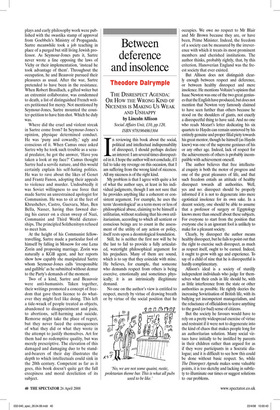Blood on their hands
David Pryce-Jones
A DANGERoUS LIAISoN: SIMoNE DE BEAUvoIR AND JEAN-PAUL SARTRE by Carole Seymour-Jones Century, ┬Ż20, pp. 574, ISBN 9781844138227 Ō£å ┬Ż16 (plus ┬Ż2.45 p&p) 0870 429 6655 The first 100 or so pages of this book almost made me give up, so saccharine is the description of the childhoods of Jean-Paul Sartre and Simone de Beauvoir, with even a reference to the latterŌĆÖs ŌĆśdear diaryŌĆÖ. I am glad I persisted. Mills and Boon duly evolves into Kraft-Ebbing. Carole Seymour-Jones may assert that she continues to admire this pair, but she has laid the foundations of a demolition job from which they should not recover.
The relationship between these two goes back to a compact in 1929 whereby they decided to have a union but not a marriage. In practice, conflating love with sexual freedom, they deceived themselves, preyed upon their innocent victims, and persuaded many people in the wider world that their nihilism was really a philosophy for the times. Private distress thus engendered public monstrosity.
An enormous amount of material, including diaries and correspondence, has been published concerning Sartre and Beauvoir, and Seymour-Jones relies on it for the dark and complex story she has to tell. Beauvoir was in the habit of picking young and often underage girls, usually her pupils, seducing them and passing them on to Sartre. Seymour-Jones does not think she was a lesbian, but has no hesitation in calling her a procurer and pimp. Whether out of perversity or to make Sartre jealous, Beauvoir was also going to bed with a whole range of male lovers. The pair evidently had fantasies and unfulfillments in common. SeymourJones cannot quite decide which of the two was dominating the other, but there is no doubting the unhappiness they generated and spread.
In the war, Sartre made no attempt to be soldierly or minimally patriotic. His career came first. I once interviewed Gerhard Heller, the German censor in occupied Paris, and he described to me how Sartre used to sit chatting in his office, stressing his debt to German culture. So SartreŌĆÖs plays and early philosophy work were published with the swastika stamp of approval from GoebbelsŌĆÖs Ministry of Propaganda. Sartre meanwhile took a job teaching in place of a purged but still living Jewish professor. As Seymour-Jones puts it, Sartre never wrote a line opposing the laws of Vichy or their implementation, ŌĆśinstead he took advantage of themŌĆÖ. Throughout the occupation, he and Beauvoir pursued their pleasures as usual. After the war, Sartre pretended to have been in the resistance. When Robert Brasillach, a gifted writer but an extremist collaborator, was condemned to death, a list of distinguished French writers petitioned for mercy. Not mentioned by Seymour-Jones, Sartre mounted the counter-petition to have him shot. Which he duly was.
Where did the cruel and violent streak in Sartre come from? In Seymour-JonesŌĆÖs opinion, physique determined conduct. He was ŌĆśpuny and cowardly,ŌĆÖ ugly and conscious of it. When Camus once asked Sartre why he took such trouble as a sexual predator, he got the answer, ŌĆśHave you taken a look at my face?ŌĆÖ Camus thought Sartre had a servile nature, and this would certainly explain his self-hating politics. He was to rave about the likes of Genet and Frantz Fanon, adopting their appeals to violence and murder. Undoubtedly it was Soviet willingness to use force that made Sartre an unrestrained apologist for Communism. He was to sit at the feet of Khrushchev, Castro, Guevara, Mao, Ben Bella, Nasser, having thus fawned during his career on a clean sweep of Nazi, Communist and Third World dictatorships. The principled Solzhenitsyn refused to meet him.
At the height of his Communist fellowtravelling, Sartre made a particular fool of himself by falling in Moscow for one Lena Zorin and proposing marriage. Zorin was naturally a KGB agent, and her reports show how capably she manipulated Sartre whom Seymour-Jones calls ŌĆśirresponsible and gullibleŌĆÖ as he submitted without demur to the PartyŌĆÖs demands of the moment.
Two of a kind, Sartre and Beauvoir were anti-humanists. Taken together, their writings promoted a concept of freedom that gave them licence to do whatever they might feel like doing. This left a tide-wrack of people treated as objects, abandoned to disappointment and pain, to abortions, self-harming and suicide. Remorse might take the place of regret, but they never faced the consequences of what they did or what they wrote in the attempt to justify themselves. Art for them had no redemptive quality, but was merely prescriptive. The elevation of this damaged and damaging duo to be standard-bearers of their day illustrates the depth to which intellectuals could sink in the 20th century. Competent as far as it goes, this book doesnŌĆÖt quite get the full creepiness and moral dereliction of its subject.











































































 Previous page
Previous page